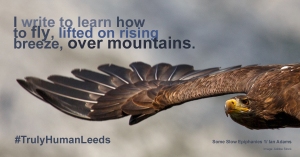 Unfurling poetry, performance and prayer
Unfurling poetry, performance and prayer
Revd Tom Lusty reflects on the experience of the ‘Unfurling’ poetry event at LCI on 21st April
This year, as a family, we have once again become addicts of Britain’s Got Talent. A lot of the offerings have moved us. A case in point was two ballet dancers, now retired, performing a short dance which represented their love for one another. One of the judges David Walliams said at the end, “I felt it was so personal, I wondered, should we really be watching this?”
That is what I feel about performance poetry. Poets can distil human experience and express it so succinctly that, on delivery of the poem, it can feel like being wounded with the reality of things that are true to human experience. I remember that sense when watching (and subsequently reading) John Hegley’s poems about emotional abuse from his collection Can I come down now Dad? It packs a punch.
I have, since before Easter, been reflecting on From the Ashes, one of Ian’s poems, a copy of which was gifted to each young person at Abbey Grange C of E Academy from the Leeds Church Institute, as well as being sent out to LCI members. It is a poem that works on lots of levels. To me it captures the moment in the grief journey when someone makes a massive step away from loss and towards transcendence. So, I already knew I liked this poet and wanted to hear more at the event at LCI. When Ian read this poem, he did indeed bring it to life.
When performing his poetry, Ian comes across as both shy and confident at the same time. That confidence increased as he got to know us and as we started to engage with his material. He has a way of expressing a poem that is understated, but is perhaps more effective for being so, you have to concentrate. We were quite a small gathering, and that enabled him to make eye contact with each person present. What he offered was something precious.
Ian’s principle theme was changing the world for the better. He also spoke, amongst other things, of romantic love, of finding the one important thing in life (whatever that was for each of us) and of doing it, and of the struggle to pray. The poem Prayer Flag was my favourite: a prayer shredded down to single thread that is our condensed hope, our hope that it has the power to move mountains.
I have long been interested in the connection between prayer and theology. When we pray our prayers should be theologically informed, that is to say, they must be true to what we fundamentally believe and trust about the reality of God. When we get the connection right, prayer can be like good poetry, being both truthful and honest. We achieve such poetry in our lives only after struggling with God to make that connection. An understanding of Christian discipleship which speaks to me is that ‘making disciples’ is about authentic living, and that includes when our prayers are in tune with the God we truly believe in. Having such integrity has, I believe, a converting power. Some of that power was present when Ian performed his poems.
